
Harrison Ford makes his Marvel debut on set of newly named 'Captain America: Brave New World'
Harrison Ford is officially in Marvel mode.
2023-06-07 09:19
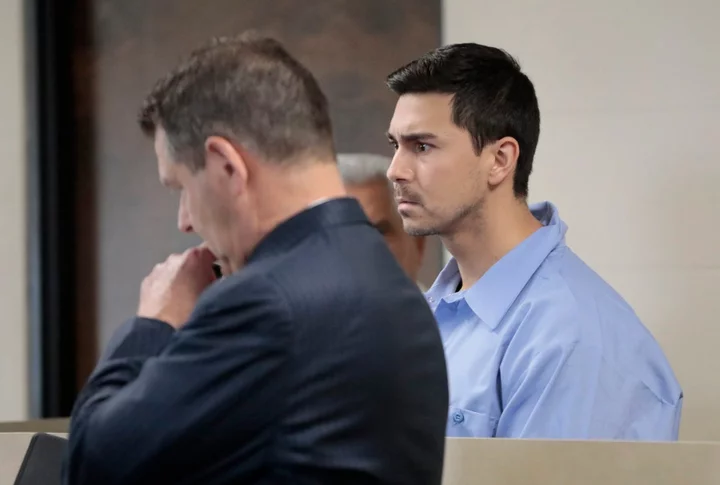
How DNA and an old glove helped police catch accused Boston serial rapist
Police say they were able to identify a suspect in a series of two-decade old rape cases out of Boston using new advances in DNA technology, eventually arresting New Jersey attorney Matthew Nilo and charging him with a variety of crimes. Here’s everything we know. The crimes Between 2007 and 2008, police investigated a series of four different sex crimes that occured involving women in downtown Boston. The victims described being threatened or tricked by a male assailant. One woman said she encountered a man in 2007 she thought she knew who offered to give her a ride as she looked for her car. The man evetually told her to “shut up,” threatened to kill her, said he had a weapon, and raped her near a Boston railyard. The second of the four attacks occured in late 2007, as a woman was leaving a State Street bar following a high school reunion. She allegedly got into a man’s car, thinking it was a taxi, and gave an address of an ATM near her appartment. The driver flashed a knife at the woman and later raped her near Terminal Street. The third incident under scrutiny by police came in August of 2008, when a man allegedly approached a woman on Boston Common and promised her money if she went to the Charlestown area with him, later allegedly holding a gun to her back and raping her. A final attack occured in December of 2008, when a 44-year-old jogger was sexually assaulted, before repelling her assailant by poking him in the eye. Police conducted rape examanations of the first three women and established a DNA profile of the attacker, but didn’t find any matches in CODIS, a law enforcement DNA database. The investigation Last year, police in Boston got a new break in the case. Using a $2.5m grant from the federal Sexual Assault Kit Initiative, they began re-examing the 2000s rape cases as part of an effort to review unsolved sexual crimes, and used new DNA techniques to advance the investigation. Using DNA taken from the original sexual assault examinations, they searched for potential suspects using DNA information submitted by family members to commercial ancestry databses GEDMatch and Family Tree DNA, eventually landing on Mr Nilo as a person of interest. Such tecniques are known as forensic investigative genetic genealogy. FBI agents surveilling the attorney saw him handle a glass and silverware at a corporate event and were able to collect a DNA sample, according to police. The DNA on the sample allegedly matched both the evidence found in the rape kits and on a sample taken from the glove one of the women used to fend off the alleged rapist. Boston Police and FBI agents arrested Mr Nilo in the lobby of a luxury building in Weehawken last week, allegedly telling him “a large package had been delivered to him that did not fit in the ... lockers where the residents pick up packages,” according to prosecutors. The suspect Prosecutors argued during an arraignment on Monday the forensic evidence was a match, with the DNA present on the glove 314 times more likely to belong to Mr Nilo than any other male. Mr Nilo, at attorney who lives in Weehawken, New Jersey, previously worked at the cyber firm Cowbell Cyber in Manhattan. The company told The Daily Mail it has suspended the attorney. “Matthew Nilo was an employee of Cowbell and was hired in January, 2023 after passing our background check,” the company said. “Mr. Nilo’s employment at Cowbell has been suspended pending further investigation.” He attended the University of Wisconsin and got a law degree at the University of San Francisco, according to court records. The rapes allegedly occured when he was home from college on breaks. Mr Nilo’s fiancée, Laura Griffin, 37, has appeared at multiple court proceedings following the attorney’s arrest. She reportedly clutched a set of rosary beads during Mr Nilo’s arraignment. The charges On Monday, Mr Nilo was charged with three counts of aggravated rape, two counts of kidnapping, and other charges. He could face up to life in prison if gound guilty. His bail has been set at $500,000, and the attorney will be subject to GPS monitoring if he is freed from jail pre-trial. Mr Nilo pleaded not guilty. “I do understand that the procedures used by law enforcement are somewhat suspect,” his attorney Joseph Cataldo told The Associated Press outside court on Monday. “It seems that they obtained DNA evidence without ever obtaining a search warrant. If that turns out to be true, that’s an issue that will be pursued vigorously.” Read More Detectives used DNA from water glass in investigation of attorney accused of rapes in Boston Fiancee of attorney linked to three rapes through genetic genealogy stands by him in court Pensioner on trial accused of murdering young woman in 1974
2023-06-07 06:29

Francesca Williams moved her family to Ecuador to build her ‘Shangri-La’. She was shot dead protecting them
In 2014, Francesca Williams moved her family from Colorado to a remote valley in Ecuador famous for the longevity of its residents to pursue their dream of building their version of “Shangri-La”. She and her husband Michael paid about $10,000 for a 10-acre plot of land on the side of a mountain just outside Vilcabamba to raise chickens, goats, horses, pigs, ducks and guinea fowl on a sustainable farm with their three daughters. It was a life they never could have afforded in the United States, but after years of hard work was starting to come to fruition, Francesca’s mother Marianna Benedict-Bacilla, 61, told The Independent in an interview. Francesca, a gifted artist, linguist, translator and published children’s author, threw her boundless energy into making the farm a success, Ms Benedict-Bacilla said. When Michael would travel back to the US for work, Francesca would remain in Ecuador with their three teenage daughters Rachel, 19, Renee 17, and Rebekah, 14, and her elderly father John to tend to the animals and plant crops. On 20 May, that idyllic life was shattered when at least four men armed with rifles burst onto the farm and shot Francesca dead. The attack was sudden, and extremely violent. The men knocked out Michael before he even realised they were on the property, and stabbed Williams’ elderly and infirm father John when he tried to intervene. Ms Benedict-Bacilla said Francesca had been hanging out the washing when she saw the assailants attack her father, and rushed to help him. “Francesca gave her life trying to save her father’s,” Ms Benedict-Bacilla told The Independent. “My daughter was petite, but she guarded her family ferociously. She always knew if there was ever a problem, nothing would get in the way.” Rachel, their middle daughter, told Colorado news site KDVR in an interview last week that she had seen her mother “scrambling after” a man trying to fight him off. Then she saw “two sparks of a gun” as the assailant fired at her mother. Her older sister ran to a neighbour’s for help. The stick up crew tied up Michael, John, and two of the daughters, and locked them in separate rooms throughout the house before making off with wallets, iPads and computers. “It was horrendous. They were essentially hostages in their own home,” Ms Benedict-Basilla said. Rachel recalled hearing the men asking in Spanish for the “large aunt”, and thought they might have targeted their home by mistake. It was only when Michael managed to untie his hands about an hour later that he found his wife’s body, Ms Benedict-Bacilla told The Independent. He put the family in their vehicle, and raced to an emergency medical centre. Michael and John received medical attention in a hospital, while the daughters were unharmed. “We were very humble people, we don’t understand why we were targeted,” Michael told San Diego’s KGTV. Francesca’s death has torn open the family’s generational trauma from the 1967 unsolved murder of her aunt Nikki Benedict who was stabbed to death walking home from school aged 14, Ms Benedict-Basilla said. ‘Everything was taken from them’ Three years before her death, Francesca Williams had written of her fears of home invasion and violent crime in her adopted home on the knowledge-sharing website Quora. Asked about Ecuadorean stereotypes, Williams said she had been told of the high risk of robberies prior to moving there. “We have not experienced this as of yet, but live in constant awareness of this danger,” she said. “I know many, many foreigners who have experienced home invasion robberies and I would not have come here if I had any idea of how close to home such attacks would be. It is essential that one have intimidating dogs and bars on one’s windows.” Ms Benedict-Basilla told The Independent the family had been especially on edge after an expat neighbour was shot dead trying to repel a home invasion. The gunmen’s modus operandi in that case was eerily similar to the attack that killed Francesca, she said. The homeowner had confronted a group of assailants as they tried to break in, and was shot dead. Ms Benedict-Basilla believes they could be the same group that targeted her family. The family are holding out hope of finding justice for Francesca, but say not enough is being done to make the town safe for the vibrant community of artists and retirees who have made it their home. “The government isn’t putting any effort into investigating the things that happen there,” she told The Independent. She said the local police were doing their best. “But they don’t give them the resources that they need and these murders aren’t being investigated.” No suspects have been identified in either killing. The local Vilcabamba police force was doing what it could, she said, but without the support of the Ecuadorean National Police there seemed to be little chance of finding the killers. The Policía Nacional del Ecuador did not respond to numerous requests for comment about the investigation. It has barely received any mention in the Ecuadorean press. In a statement, a US State Department spokesperson told The Independent: “We offer our sincerest condolences to the family on their loss. “We are in contact with the family and are providing all appropriate consular assistance. “We refer you to the government of Ecuador for information regarding any local investigation.” State Department figures show 15 US citizens were murdered in Ecuador between 2010 and June 2022, but it’s unclear if those figures capture recent attacks around Vilcabamba. Francesca’s family have taken little comfort from the Ecuadorean authorities’ response, and will not be returning, Ms Benedict-Basilla said. “Everything was taken from them.” ‘The Valley of Longevity’ In expat forums, adopted residents have spoken out about the “impotence” of the local police force to combat a rising tide of rape, home invasion and murder against the foreigners who have made Vilcabamba their home. In response, local expat communities have formed neighbourhood security groups, and any disturbances are quickly shared through WhatsApp groups. The town, situated in the lower Ecuadorean Andes near the border with Peru, gained worldwide attention in the 1970s, when Harvard professor Alexander Leaf travelled there to report on claims that residents were living to the age of 130 for National Geographic. The subtropical valley’s year-round spring climate, crystal-clear water, pollution-free air and abundance of produce supposedly supposedly allowed the male residents to continue to carry out manual labour and conceive children until well past 100. The area, known as The Valley of Longevity, became inundated with gerontologists who wanted to know more about how that delicate balance of good genes and healthy natural environment was prolonging lives. They later grew sceptical about some of the residents’ claims when they were unable to produce credible birth records. But that didn’t stop a large number of expats moving there to buy property over the years, gentrifying the area, and sometimes bringing them into conflict with the locals who still worked the fields for a few hundred dollars per month. By 2007, that global fame was harming Vilcabamba’s local community, according to a Reuters report. “These days, the famous elders of Vilcabamba are dying at a younger age, the result of the stresses of modern life brought by the scores of tourists and health buffs who flock here in search of eternal youth,” Reuters wrote. ‘Generational trauma’ In May 1967, Ms Benedict-Bacilla’s sister Nikki Benedict was stabbed to death while she walked home from her friend’s house in Poway, near San Diego, aged just 14. She suffered knife wounds to the neck and chest in the brazen daylight attack and was found bleeding to death in a field. The murder has never been solved. Their mother had been the editor of the local newspaper at the time, and had to write an article about her own daughter’s death, Ms Benedict-Bacilla told The Independent. Ms Benedict-Basilla was five at the time, and the tragedy, and lack of answers about what had happened defined her childhood, she said. “It was all I ever knew,” she said. “We’ve had so much family tragedy. You don’t heal, you just get stronger.” Ms Benedict-Bacilla runs a Facebook group dedicated to finding her sister’s killer, and speaks out every anniversary of her death to keep focus on solving the heinous killing. As a way of dealing with her own psychological wounds, Ms Benedict-Bacilla became a specialist in trauma intervention and volunteers for the American Red Cross and the Poway Community Emergency Response Team. She likens the kind of generational trauma that her family suffered after Nikki’s murder to a “cancer” that can never fully heal, but can only be managed through finding strength in keeping their loved ones memory alive. She had seen Francesca grow up in the shadow of that trauma, and took comfort from the fact that her granddaughters would be one generation removed from it. “They stole (Francesca’s) future, and they stole her children’s future. It will be part of them now because that’s how generational trauma works,” she told The Independent. ‘A quest for knowledge’ Francesca Williams excelled at anything she turned her hand to, Ms Benedict-Basilla told The Independent. “She was an extraordinarily gifted person, just mega-smart,” Ms Benedict-Basilla said. Coming from four generations of journalists and editors, Francesca Williams wanted to be a writer from an early age, her mother said. But when it was time to choose a major, she opted to study linguistics at the University of California, San Diego. She was fluent in French and Lithuanian, her great-grandmother’s home tongue. She had known her husband Michael since they were children, and decided to move from Poway to Kommerling, Colorado, when the cost of living in California became too high. Francesca hadn’t known Spanish prior to moving to Ecuador, and within a year she was fluent and carrying out legal transcriptions, her mother said. She had also recently published her first illustrated children’s book, The King’s Magic, and was a brilliant artist on “any medium”, her mother says. “Anything she touched she turned into beautiful art. A lot of people who are that bright can get into trouble in life, she put it all into a quest for knowledge.” Francesca’s body was returned to the US last week, but the family are still trying to get their beloved Corgi Banksy home. Her funeral was held in Colorado on Saturday 3 June. A GoFundme page has been set up to help the family. Read More American expat shot dead on her ‘Shangri-La’ off-the-grid farm in Ecuador Ecuador's president declines to run in snap elections after he disbands National Assembly Funeral held for teen shot by gas station owner over false shoplifting claims as community shares outrage
2023-06-07 05:47
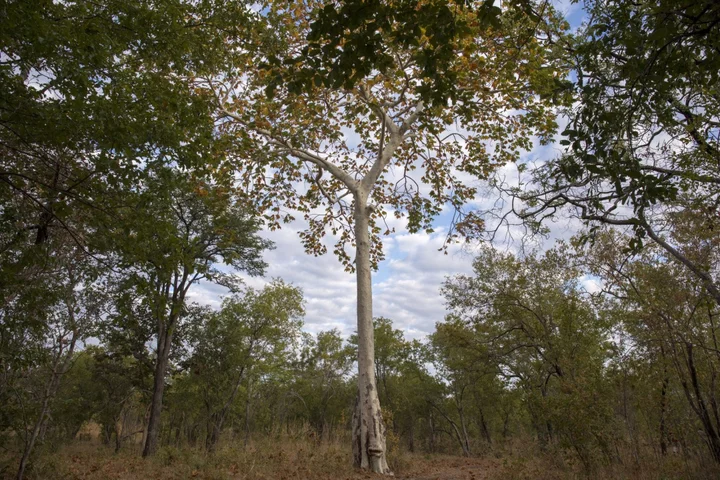
Global Carbon Markets Face Upheaval as Nations Remake the Rules
The $2 billion market for carbon offsets is heading for a massive reset, as a growing number of
2023-06-06 08:18

Burna Boy makes history with sold-out London Stadium gig
A crowd of 60,000 fans screamed the Grammy award-winner's Afrobeats lyrics back to him at the London Stadium.
2023-06-05 21:56

Saudi Arabia, US Make Tentative Steps Toward Healing Deep Rift
US Secretary of State Antony Blinken’s visit to Saudi Arabia this week is the latest sign of improving
2023-06-05 19:47
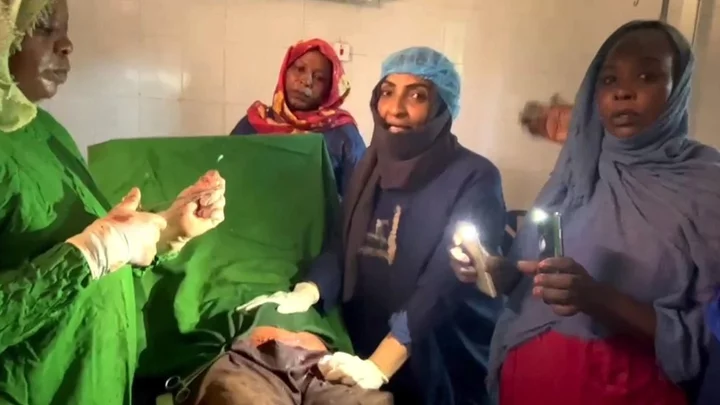
Sudan conflict: Caesarean by phone light - giving birth in a warzone
Women in Sudan's few remaining maternity wards are having babies to the sound of gunfire.
2023-06-04 07:29

Rahul Gandhi in US: Why Indian politicians woo the diaspora
Experts say Indian politicians' engagement with the Indian American diaspora is "unique".
2023-06-03 07:56
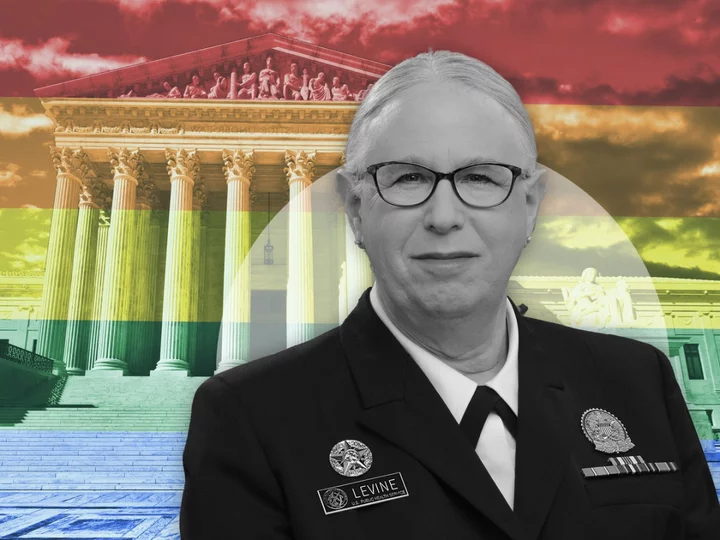
Rachel Levine on Congress bigots, Don’t Say Gay and life as Biden’s top trans official: ‘Despair doesn’t motivate change’
"I'm not the best person for hobbies," says Dr Rachel Levine. In her 40 years of practicing medicine, four of which were spent running the health department of the state of Pennsylvania, she has rarely had much time for recreation. Now she is not only the assistant secretary of state for health for the whole United States under president Joe Biden, but also the most senior openly transgender government official in American history. More than that, she has taken a strong line supporting trans children and transition healthcare at a time when they are under unprecedented attack. According to the non-profit Human Rights Campaign, 19 states have banned transition healthcare for under-18s, and eight more are considering doing so. Meanwhile, medics and patients – including at Boston Children's Hospital, which established the nation's first trans health programme for children and adolescents in 2007 – have received a storm of harassment and threats. "I know the people who developed that clinic. I know them all personally," says Levine, 65, who grew up in Massachusetts and still speaks with a touch of New England in her accent. "I remember when that clinic was formed... now it's under siege by people with political and ideological motivations. "So we need to support trans youth, we need to support their families and we need to support these expert providers that are providing this careful, intentional care according to well-established evidence-based standards." Levine is speaking to The Independent via Zoom from her office in Bethesda, Maryland, flanked by flags, her white hair tied tightly behind her head. As a four-star admiral in the US Public Health Service Commissioned Corps, she wears military-style blue overalls modeled on those of the US Navy and Coast Guard. She does not, she explains, consider herself to be a politician. She has never run for or been elected to office. Instead she sees herself as simply a doctor and a public servant, who now has a rare ability to advocate for her community, as well as overseeing public health areas raging from abortion rights through long Covid to the unequal impact of pollution and natural disasters. But politician or not, her identity has made her a lightning rod for criticism and, sometimes, viotriolic bigotry from anti-trans conservatives. Her name is a fixture in online extremist spaces, where her appointment is painted as part of a conspiracy to overturn traditional gender roles. "When I receive that pushback, I sublimate it," she says, using the psychological term for turning a negative mental energy towards useful ends. "I am a positive and optimistic person because I choose to be positive and optimistic. I can be pessimistic and in despair, but that doesn't motivate change." ‘Trans healthcare is medicine like any other’ Born in 1957, Levine attended an all-boy's school near Boston and studied medicine at Harvard and Tulane University, before completing her training at a hospital in New York City where she specialised in paediatrics and psychology. In 1993, in what she has called her wryly called "most difficult transition", she moved southwest to become a professor at the Penn State, a position she still holds today. In 2015, however, her life took a different turn when Pennsylvania's incoming Democratic governor Tom Wolf asked her to co-chair his health policy transition team and then to be his physician general – a job that would put her right in the merciless gaze of national politics and media. Four years earlier, after decades of "compartmentalising" her feelings, Levine had come out as a trans woman in her fifties. Yet although the backlash against trans rights was already in the offing, her appointment was unanimously confirmed by the state legislature, later becoming Pennsylvania's health secretary and leading its response to Covid-19. Her US Senate confirmation hearing in 2021 was another matter. Republican senator Rand Paul asked her whether children were capable of consenting to medical transition, falsely describing sex reassignment surgery as "genital mutilation". All 50 Democrats and two Republicans voted to confirm her, while the other 48 Republicans voted against. "My confirmation hearing was – interesting," says Levine now, with only the shortest pause, "but not unexpected, and so I was able to navigate that." She adds that although she doesn't deal frequently with Congress, most politicos have treated her "respectfully". As a paediatrician, Levine argues that treatments such as puberty blocking drugs and hormone replacement therapy (HRT) for under-18s should be treated just any other childhood medicine. (Breast removal surgery is rarely prescribed for trans teenagers, and never for younger children, while genital surgery for under-18s is almost unheard of). "Transgender care for youth is medical care; it is mental health care; it is literally suicide prevention care," says Levine. "And it is based upon a well-established standard of care which continually gets updated, as all standards of care do... "It always needs to be done carefully, usually with national or international standards, and then it's individualised to the patient and the family. That's how we do paediatric care. It is no different for transgender medicine." One supportive adult can make the difference Critics of medical transition sometimes liken gender dysphoria – that is, feelings of discomfort or horror related to one's gender – to eating disorders, arguing that both involve an irrational aversion to one's natural body. Levine, who is an expert on eating disorders, pooh-poohs that idea, saying the causes of and solutions to each condition are completely different. Although young trans people do have worse mental health on average than the US population, she says evidence shows that is not caused by being trans but by the way they are being treated by others – a problem exacerbated by anti-trans laws and rhetoric. "Young people who receive support and standard of care treatment have excellent mental health outcomes," she says. "They have depression and anxiety because they're being harassed and bullied, and they're not being allowed to transition. If you facilitate them being who they are, their mental health gets better." Nor is there any evidence, she says, for a theory widespread among anti-trans activists: that young people are being falsely persuaded that they are trans by "social contagion" from their peers. She describes an often-touted 2018 paper by medicine professor Lisa Littman, proposing that trans children may be suffering from "rapid onset gender dysphoria" (ROGD), as "flawed". A group of medical organisations including the American Psychological Association and the American Psychiatric has since warned against applying the concept of ROGD in clinical contexts, describing it as based on "unsupported claims" and likely to "stigmatise" trans people. Littman corrected her paper in 2019 after intense criticism of its methods, and the journal that published it issued an apology. "All the evidence really points to better communication and understanding about gender identity among young people, so that they understand who they are and they come out," says Levine. "There's a lexicon, there's a language, there's support. And more parents understand, and there has been more availability of treatment, and there still is availability of treatment." All of those are things Levine herself never had as a child. "I grew up in the Sixties and Seventies," she says. "There was no terminology, there was no internet, there was no Google. And so I did not understand the thoughts and feelings I was having about gender identity." Even though she had supportive adults in her life, she says there was no way to ask them about being trans because the concept was so unknown. "Who are you going to tell? And what would you have said? None of the language was there." Today she frequently touts a study by The Trevor Project, an American LGBT+ support charity, showing that having even one adult in their life who supports their gender identity can meaningfully lower a young trans person's likelihood of attempting suicide. It is why she is so concerned about Florida's so-called "Don't Say Gay" law and other similar laws, which ban teachers from discussing LGBT+ issues in public schools. "That one supportive adult might be a parent or a relative, but it might not," says Levine. "It might be a teacher, or a coach, or guidance counsellor, or someone else in the community that makes that difference... "[Florida's law] makes it so difficult for a young person to be able to talk to, potentially, that teacher or that coach or that guidance counsellor, because that person then has to immediately tell the young person's parents by that state law." While Republican state legislators seek to pass laws that would make it more difficult for trans people to get healthcare, work in education, or exist in public, a few figures have explicitly called for violence. One GOP candidate last year called for supporters of trans rights to be tried and executed for treason, while a conservative pastor said LGBT+ people should be “lined up against the wall and shot in the back of the head”. ‘Most people in the country don’t hate us’ Some trans people and supporters see all this as a potential precursor to genocide, accusing opponents of wanting to "eliminate" trans people from society by making transition all but impossible. Machaela Cavanaugh, a progressive state legislator in Nebraska, told The Independent last month that trans healthcare bans were a form of "extermination". Does Levine agree? "I would not characterise it as that," she says, although she adds: "I understand the feelings of people who say that, given the hateful rhetoric and the laws and actions being taken." There are many people in the public who have been misled, and I think they are able to be educated about the truth Rachel Levine She likewise rejects the more adversarial approach to fighting for LGBT+ rights that is pithily summarised in the slogan "the first Pride parade was a riot". Instead she sees Pride Month as an opportunity for "advocacy" – for trans people to tell their stories and help educate those who do not understand their lives. The reason, she claims, is that true bigots are merely a "vocal minority", part of a coordinated campaign by conservative think tanks and politicians who lost the argument against gay marriage and are now looking for the next "wedge issue" to divide the electorate. "We're probably not going to change their minds," she says. "But then there are many people in the public who have been misled, and I think they are able to be educated about the truth." She cites the trans author Jennifer Finney Boylan, who wrote that "it's impossible to hate anyone whose story you know", as well as the Jedi master Yoda, who intoned: "Fear leads to anger; anger leads to hate; hate leads to suffering." In other words, people fear what they don't understand – and if they understand more about actual trans people rather than the demonic caricatures of anti-trans invective, they won't go down that path. "I think this is a significant setback, which happens on the road to equality and fairness and freedom. We have seen this in many other times," she says. "So I do not think it will stand, and I think the wheel will turn. "But I do freely admit that it is very difficult and very challenging for members of our community... I think that we are strong, and I think that we are resilient, and I think that we are strong." She pauses for a moment. "But I have to tell you, I choose to believe that." Not all LGBT+ activists feel the same way. Some have accused the Biden administration not doing enough to stem the tide of anti-trans bills, while others have attacked its recent guidance on trans participation in school sports as a surrender to conservatives. Yet Levine is confident that President Biden "supports our community unconditionally", and says there has never been such strong solidarity with LGBT+ people at the top levels of any US government. She cites the President's 13-point executive order last Pride aiming to curb anti-LGBT+ discrimination, the health department's action against conversion therapy, and her work with the Office of Civil Rights to reverse Trump-era changes that weakened rules against discrimination in healthcare. At age 65, she has already seen transgender people go from complete social pariahs, living in the shadows of a society that made no provision for them, to having access to medical transition and at least a chance – sometimes a good chance – of being fulfilled and successful while being open about who they are. So if and when she does have time for hobbies again, what would she do? "I would like to have more time to meditate," she says. "I have meditated in the past and it's pretty hard to add it to my current day, but I have found mindfulness and meditation to be very helpful." Hikes and long walks, too, would be on her agenda. "I used to run," she adds, a little wistfully. "Now I walk." Read More Thousands march in Jerusalem Pride parade, first under Israel's most right-wing government ever LGBT+ flags vandalised for a fourth time at Canada church on eve of Pride Month LGBTQ+ people flock to Florida for Gay Days festival Pride profile: I will be the first asexual grand marshal at NYC’s Pride March Rufus Gifford: The gay man serving as the ‘American welcome’ to foreign leaders Kershaw disagrees with Dodgers’ decision to reinstate gay ‘nun’ group for Pride Night
2023-06-02 01:29
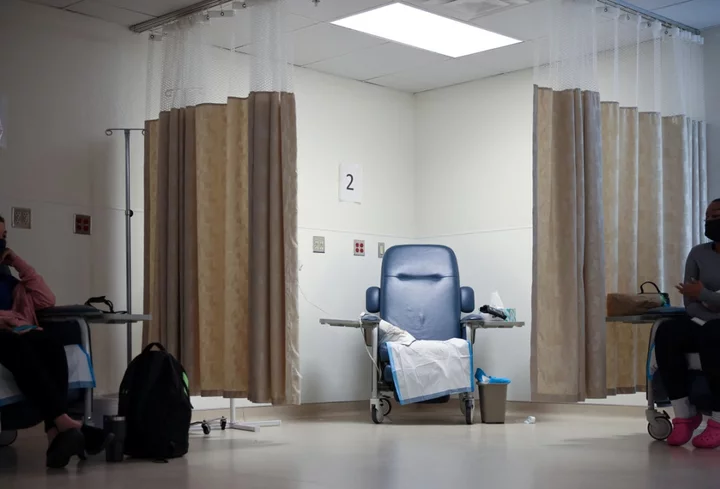
Oklahoma’s Supreme Court struck down two abortion bans. But a 113-year-old law is severely restricting access
Weeks before the US Supreme Court overturned Roe v Wade last year, Oklahoma’s Republican governor vowed to “outlaw” abortion in the state entirely, and pledged to sign any legislation that promised to do just that. Governor Kevin Stitt signed several anti-abortion bills into law, including a measure that outlaws abortion at roughly six weeks of pregnancy, and another banning all abortions with exceptions only to save the patient’s life in a medical emergency or if the pregnancy is the result of rape, sexual assault or incest that has been reported to law enforcement. On 31 May, the highest court in the state struck down both of them. But abortion access remains out of reach for most patients in the state, after that same court upheld a far-reaching abortion ban from more than 100 years ago earlier this year. A state law from 1910 makes it a felony punishable up to five years in prison for anyone to perform or help someone seek an abortion unless to save the patient’s life. “This ruling, while providing clarity in emergency situations, does not change the landscape of care significantly,” Emily Wales, president and CEO of Planned Parenthood Great Plains, said in a statement. Oklahoma was the first state in the US to successfully outlaw abortion despite a constitutional right to abortion care that was affirmed by Roe v Wade. But in March, the state’s Supreme Court ruled that the state’s constitution “creates an inherent right of a pregnant woman to terminate a pregnancy when necessary to preserve her life,” though the court declined to weigh in on whether the constitution protects abortion access in other circumstances. The court also ruled that doctors should be able to use their own medical judgment to determine whether to provide an abortion when a patient’s life is at risk “due to the pregnancy itself or due to a medical condition that the woman is either currently suffering from or likely to suffer from during the pregnancy.” But it also preserved the 1910 law, a 113-year-old ban on abortion care that threatens providers with prison. The court’s decision on 31 May reaffirmed its decision recognising a right to abortion care in life-threatening cases, and struck down two the overlapping bans. In the months after the Supreme Court’s decision in Dobbs v Jackson Women’s Health Organization, which struck down a constitutional right to abortion care, clinics in Oklahoma have been forced to close, and patients have traveled thousands of miles for legal abortion care in a region surrounded by states where abortion is severely restricted or effectively outlawed. Even in cases of emergencies, there appears to be no hospital in Oklahoma that provides “clear, consistent policies for emergency obstetric care to pregnant patients,” according to an April report from Physicians for Human Rights, Oklahoma Call for Reproductive Justice and the Center for Reproductive Rights. Oklahoma hospitals “offered opaque, contradictory, and incorrect information about abortion availability and approval processes in obstetric emergencies, as well as little reassurance that clinicians’ medical judgment and pregnant patients’ needs would be prioritized,” according to the report. Only two out of 24 hospitals described providing legal support for providers in such situations, and representatives for three hospitals claimed their facilities do not provide abortions at all, the report found. Abortion rights advocates welcomed the court’s decision on 31 May, which abortion rights advocates said will at least allow doctors to clearly rely on their own medical judgment to provide care when a patient’s life is in jeopardy. “After months of uncertainty and chaos, Oklahomans should finally be able to access the life-saving care they need in their home state,” according to Dr Alan Braid, an abortion provider and plaintiff in the case challenging the overlapping abortion bans. “Heartbreakingly, we were forced to close our Tulsa clinic due to Oklahoma’s abortion bans, but I will continue to serve patients in the region at clinics in Illinois and New Mexico,” he added. “While we are relieved the court upheld the right to abortion in medical emergencies, this does not diminish the fact that care remains out of reach for the majority of Oklahomans,” according to Ms Wales. Following the state Supreme Court decision on 31 May, Oklahoma Attorney General Gentner Drummond clarified that “except for certain circumstances outlined in that statute, abortion is still unlawful in the state of Oklahoma” because of the 1910 law. Governor Stitt accused the court of using “activism to create a right to an abortion in Oklahoma.” “This court has once more over-involved itself in the state’s democratic process, and has interceded to undo legislation created by the will of the people,” he said in a statement. Within the last year, more than a dozen states – including most of the entire US South – have outlawed abortion care for most pregnancies. Read More ACLU sues Nebraska over combined law targeting abortion and gender-affirming care: ‘Egregious overreach’ South Carolina judge halts six-week abortion ban as state Supreme Court set to review new law Doctor who provided abortion care to 10-year-old rape survivor reprimanded in case that drew national scrutiny Anti-abortion laws harm patients facing dangerous and life-threatening complications, report finds
2023-06-01 07:22
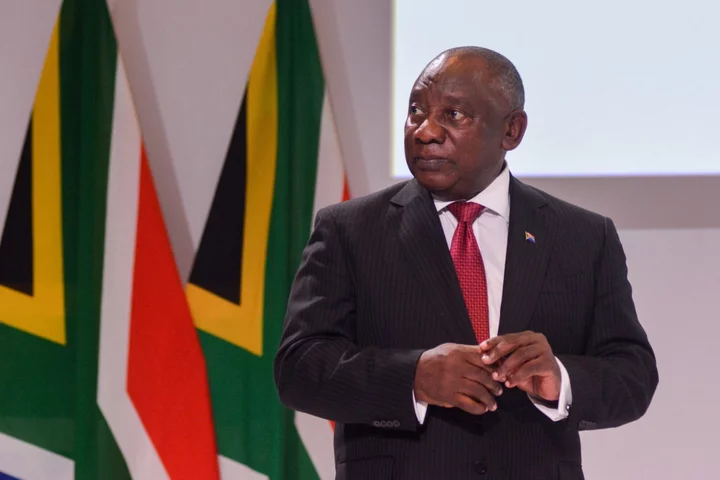
Ramaphosa Advisers Say South Africa Must Shun Coal, Use Minimal Gas
South Africa’s Presidential Climate Commission has advised the country, which relies on coal for most of its electricity,
2023-05-31 04:17
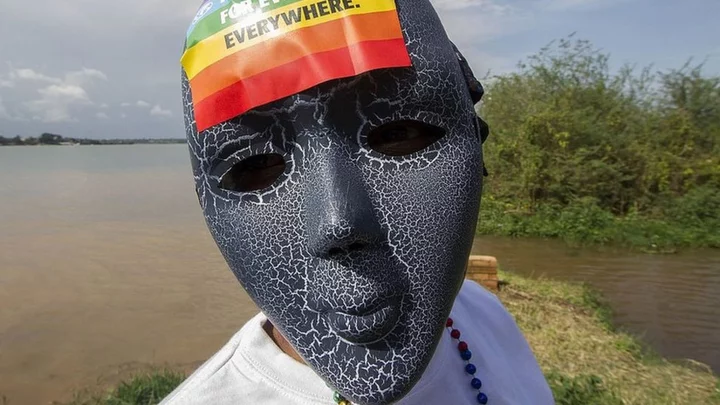
Uganda's President Museveni approves tough new anti-gay law
UNAids and the US warn that Uganda's progress in tackling HIV is now in "grave jeopardy".
2023-05-29 20:56
